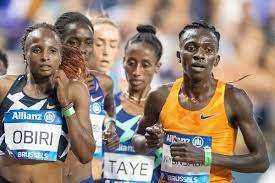
World Athletics president, Lord Coe, has announced that transgender women are to be banned from competing in the female categories at international events.
The head of the governing body said no transgender athlete who had gone through male puberty would be permitted in female world ranking competitions from the end of the month, meaning that from 31 March they will be in limbo.
Lord Coe, probably better known as former middle distance Olympic champion Sebastian Coe, insisted “We are not saying this is forever,” but he added that there was a need to set up a working group to conduct further research into the transgender eligibility guidelines, and that the decision they had made had been guided by what he called “ the overarching principle which is to protect the female category.”
Under previous rules, World Athletics required transgender women to reduce their amount of blood testosterone to a maximum of 5nmol/L, and to stay under that threshold for a period of 12 months without any break, before competing in any female category.
Lord Coe made the point that at present there are no transgender athletes competing internationally in the sport, therefore this was probably a good time to clarify the guidelines.
Change of heart
Less than three months ago, in January of this year, World Athletics stated that its “preferred option” would be to continue to allow transgender women to compete in the female categories, but with the proviso of tightening up the eligibility rules, while still using testosterone limits as the basis for inclusion.
The initial proposal was for transgender women to be required to reduce their blood testosterone level to below 2.5nmol/L, down from five, and additionally they should remain under that threshold for two consecutive years, before becoming eligible to compete internationally in a female category of any track and field event.
Split opinions
Since then World Athletics have let it be known that there was “little support” for this option when they presented the proposition to stakeholders, who included the International Olympic Committee (IOC), member federations, athletes, coaches, and representative transgender and human rights groups.
There are many leading voices who argue strongly that transgender women should not compete in elite women’s sport because of any advantages they may retain; but the counter argument centres around the need for sport to be more inclusive. The debate splits opinions and striking a balance between sporting fairness, safety in women’s sport and inclusion.
Federation responsibility removed
Responsibility in determining eligibility in specific sports had been placed in the hands, or feet, of individual federations who could set particular criteria. This was in line with the IOC’s framework on transgender athletes, which was released in November 2021.
Within that there was a statement which suggested that there should be no assumption that a transgender athlete automatically has an unfair advantage in female sporting events. However, in February, UK Athletics said it wanted a change in legislation in order to ensure the women’s category is lawfully reserved for competitors who are “recorded female at birth.”
Working group to be set up
An independent chair will lead a working group for 12 months, while it will also include up to three council members, two athletes from the Athletes’ Commission, a transgender athlete, three representatives of World Athletics’ member federations and representatives of the World Athletics health and science department. Crucially, it will consult specifically with transgender athletes, as well as review and commission research, before putting forward their recommendations.
Lord Coe insists governing body seeking only fairness
Lord Coe acknowledged that decisions that involve conflicting needs and rights between different groups were always difficult, but insisted that as a governing body they had to take the view that there was a genuine necessity to maintain fairness for female athletes above all other considerations. He said: “We will be guided in this by the science around physical performance and male advantage which will inevitably develop over the coming years.”
He made the point that as more evidence becomes available, they would be able to review their position, but again was convinced that they were acting in female athletes best interests, stating: “We believe that the integrity of the female category in athletics is paramount.” He also was keen to add that World Athletics would form a task force to study the issue of trans inclusion, which would be chaired by a transgender athlete.
Swimming in agreement
FINA, who are the world governing body in swimming, stopped transgender swimmers from competing in women’s elite races from June of last year, if it transpired that they had gone through any part of the process of male puberty; then clarifying their stance by insisting that “fairness is non-negotiable”.
They had reached their conclusions following a report produced by a scientific panel of leading figures from the world of sport, law, and medicine, who made up a formidable taskforce. It made the distinction that anybody who went through male puberty would mean that transgender women retained a “relative performance advantage over biological females”, and decisively, that would be even after medication to reduce testosterone. There was a 71% vote in favour of the ban.
Naturally there was opposition to the ruling with high profile figures speaking out, such as Tom Daley, the Olympic diving champion who was “furious” at the decision, saying: “Anyone that is told that they can’t compete or can’t do something they love, just because of who they are, it’ is not on.”
Follow Rugby’s lead
In 2020 there was a ruling made by World Rugby, which made them the the first international sports federation to deny transgender women the right to compete at the elite and international level of the women’s game in their sport.













0 Comments